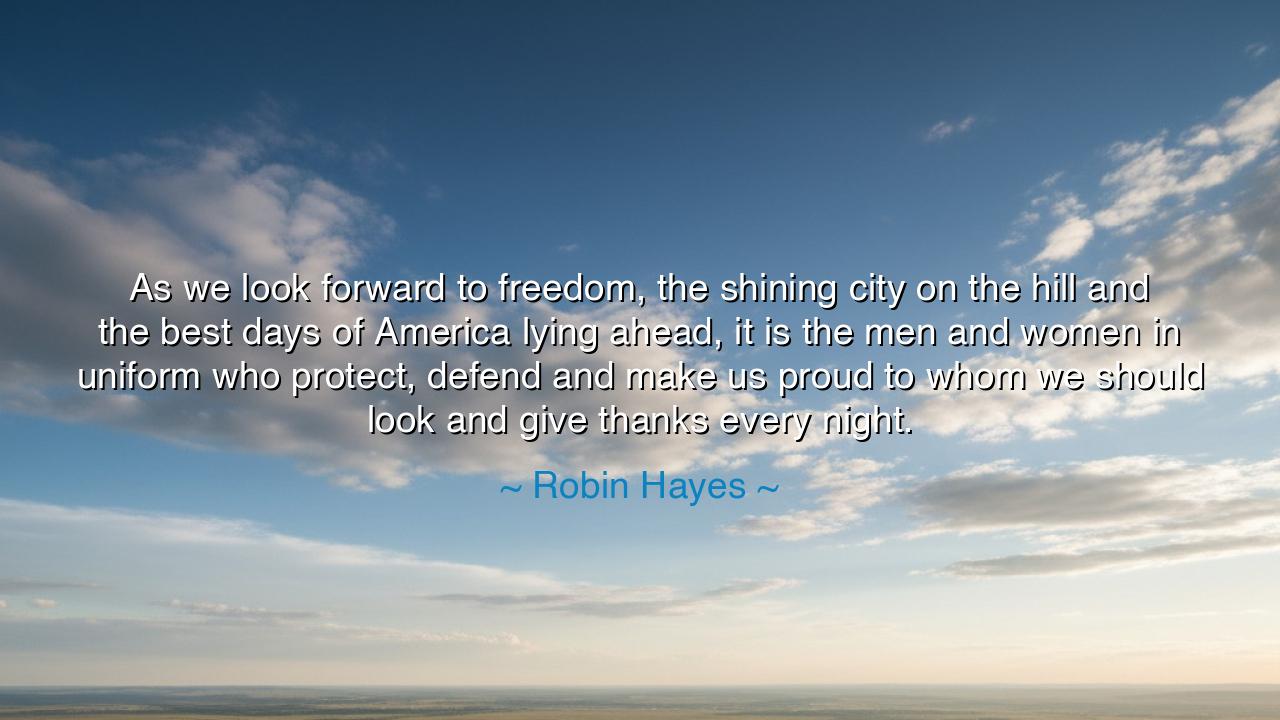
As we look forward to freedom, the shining city on the hill and
As we look forward to freedom, the shining city on the hill and the best days of America lying ahead, it is the men and women in uniform who protect, defend and make us proud to whom we should look and give thanks every night.






The words of Robin Hayes, “As we look forward to freedom, the shining city on the hill and the best days of America lying ahead, it is the men and women in uniform who protect, defend and make us proud to whom we should look and give thanks every night,” carry the weight of both gratitude and vision. In them is contained the wisdom of ages: that liberty is not self-sustaining, but safeguarded by sacrifice. Hayes invokes the image of the shining city on the hill, a phrase echoing from the sermons of John Winthrop and carried through American history as a symbol of hope, virtue, and destiny. Yet he reminds us that such a city shines only because it is defended by those willing to bear the burden of arms and the weight of danger.
To look toward freedom is to look toward a dream yet unfinished. Freedom is never static, but always becoming, always defended, always renewed. Hayes places before us the reminder that the men and women in uniform — the soldiers, sailors, airmen, and guardians — stand as the living walls of that freedom. The ancients knew this truth as well. In Athens, democracy flourished not by accident, but because hoplites and rowers stood ready to shield their city from tyranny. Freedom, whether ancient or modern, is fragile, and it survives only by the courage of those who defend it.
When Hayes declares that it is these defenders “to whom we should look and give thanks every night,” he elevates gratitude as a civic duty. The people must not take liberty for granted, nor assume their safety comes cheaply. History warns us of what happens when defenders are forgotten. After the Peloponnesian War, when Athens failed to honor and sustain its veterans, the city fell into decline, weakened by ingratitude. A nation that forgets those who defend it has already begun to hollow from within. Thus, gratitude is not mere courtesy; it is the cement that binds the people to those who safeguard them.
We see this truth illustrated in the story of World War II, when millions of young Americans crossed oceans to fight tyranny abroad. They endured unimaginable hardship — the beaches of Normandy, the skies of Europe, the islands of the Pacific. Many never returned, but those who did were welcomed as the “Greatest Generation.” Their sacrifice not only defended freedom but rebuilt the nation afterward, proving Hayes’s words true: they did not just protect, they also inspired pride and hope for the future. The shining city endured because they bore the darkness of war.
In his quote, Hayes also reminds us that pride in a nation is rooted in service. The “best days of America,” he says, lie ahead — but they are not guaranteed. They are shaped by the courage of those who step forward in uniform, by the unseen nights on guard, by the silent sacrifices of families waiting at home. To look forward with hope, we must first look backward with gratitude. For the future is built on the foundation of honor given to those who carried the weight of yesterday.
The lesson for us is both solemn and inspiring: freedom demands gratitude. Each night, as Hayes declares, we should give thanks — not abstractly, but consciously, remembering that our ease, our safety, our peace are borne by others’ vigilance. Gratitude must also move into action: supporting veterans, caring for the wounded, uplifting families, and teaching the next generation that freedom is not a right without cost.
As practical action, let us build habits of remembrance. Pray or reflect each evening for those on watch. Reach out to a veteran with words of thanks. Teach your children the stories of sacrifice, so they may never forget. Support organizations that aid those who served. In doing so, we honor the spirit of Hayes’s words, and we ensure that gratitude is not fleeting, but woven into the fabric of national life.
Thus, the voice of Robin Hayes joins the ancient chorus of wisdom: the shining city on the hill glows not by itself, but by the sacrifice of its guardians. To them belongs our pride, to them belongs our gratitude, and by honoring them, we safeguard the light of freedom for the generations yet to come.






AAdministratorAdministrator
Welcome, honored guests. Please leave a comment, we will respond soon